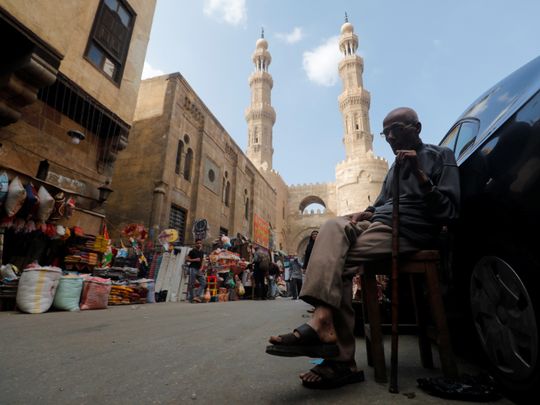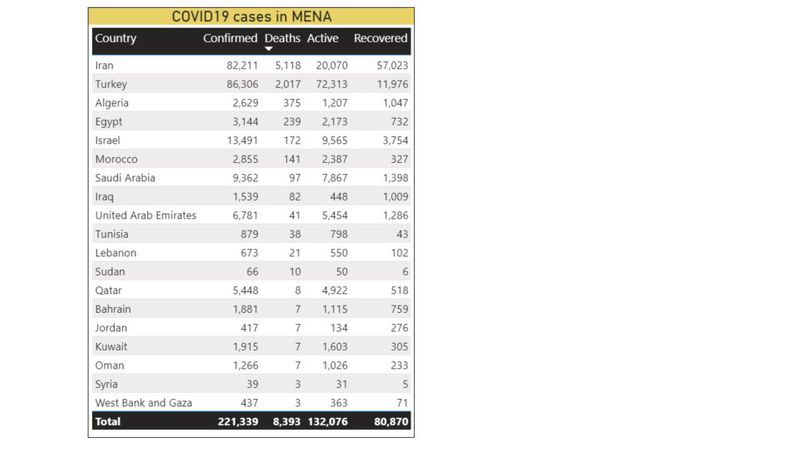
Cairo: Nicknamed the “city of a thousand minarets” due to its large number of mosques, Cairo appeared unusually quiet as calls to evening prayers reverberated across the mega-city’s deserted streets, urging worshippers to do the prayer in their homes.
The situation has been like this since late March when Egypt’s Islamic authorities closed mosques nationwide for daily and weekly group prayers as part of efforts to halt the spread of the new coronavirus in the country of about 100 million people.
Congregations
The shutdown is set to persist during Ramadan, which begins later this week.
The holy month is normally characterised by congregations in mosques, including the nightly Taraweeh prayer. In the run-up to Ramadan, many Egyptians turned to social media, voicing fervent hopes that the mosques will reopen so that they will perform the Taraweeh there.
The Awqaf Ministry, which is responsible for mosques in Egypt, has dashed such hopes, ruling out an imminent end to shutdowns.
The ministry has said that reopening of the mosques hinges on the end of the virus threat and health authorities’ confirmation that there is no health risk any more from mass gatherings.
Remaining closed
“There is no possibility for doing the Friday prayer, daily prayers or the Taraweeh in mosques until the reason for shutting the mosques is over, given that gatherings in general are one cause of transmitting the coronavirus,” the ministry said in a statement. “The mosques will remain closed until no new positive virus cases are recorded,” it added.
The stance has drawn backing from Egypt’s leading Islamic institutions and clerics.
“Everyone has to heed the state instructions and avoid gatherings, which lead to the spread of the contagion,” Osama Al Hadeedi, the director of Al Azhar Fatwa Centre, said.
He added that the ban on prayer in mosques is aimed at protecting the worshippers and preventing the spread of the highly infectious ailment.
Series of anti-virus precautions
Like other countries, Egypt has put in place a series of anti-virus precautions that also include a ban on all large public gatherings and a nighttime curfew.
Al Hadeedi noted that the Taraweeh is a voluntary prayer done following the traditions of Prophet Mohammad (peace be upon him).
“Now that the obligatory daily and Friday prayers have been performed in homes due to the coronavirus spread, then the Taraweeh should be offered in homes, too,” he added. “Like other prayers, the Taraweeh can be performed at home individually or in a small group led by the family head.”
He warned against bigger crowds of people coming together to do congregation prayers such as the Taraweeh, saying such gatherings are prohibited by health experts as a way of spreading the virus.
Not necessary to do it in mosque
Agreeing, Ahmad Karima, a professor of Islamic jurisprudence at Al Azhar University, said the Taraweeh does not necessarily require to be performed in a congregation or a mosque to be valid.
“It can be prayed anywhere individually or in a group,” he said. Karima elaborated that Prophet Mohammad had done the Taraweeh in a group only twice, and individually at other nights.
“Is the Taraweeh, which is optional, equal to the Friday prayer which is obligatory?” he wondered, citing scholars’ view that the latter - the Friday prayer - can be suspended if its performance becomes hard or harmful under risky circumstances.
Egyptian religious authorities have recently sacked some appointed imams for reopening mosques to do group prayers in violation of the virus-induced ban.
Karima criticised attempts to circumvent the ban on mosque prayers.

Sharia and science not at odds
“Getting round instructions of the ruler and state institutions is religiously sinful. Obeying the ruler is a duty. The faithful should not give precedence to optional religious acts over the obligatory ones,” he said. “The duty now is to abide by precautions to prevent the spread of infection,” he added.
“The Islamic Sharia and science are not at odds. So, when people of science and medicine say that gatherings result in coronavirus infections, we should heed their warning because preserving life is high among the Sharia objectives.”
In an attempt to overcome the mosque shutdowns, some Egyptians have reportedly developed the habit of gathering on house rooftops and perform the group prayers.
Impermissible
Egypt’s top Islamic authority Dar Al Ifta, which is in charge of issuing fatwas or binding religious edicts, has described such gatherings as impermissible and warned that they can result in infections among worshippers.
For Amna Nuseir, a professor of Islamic philosophy, this Ramadan should be a time for home worshipping.
“In view of the closure of mosques, the curfew in the street and health isolation, Muslims should make their homes as mosques for prayers and other aspects of worshipping,” added Amna, who is a member of Egyptian parliament.
“Prayers have not been cancelled. Each family head can lead his wife and children in praying at home,” she said.


